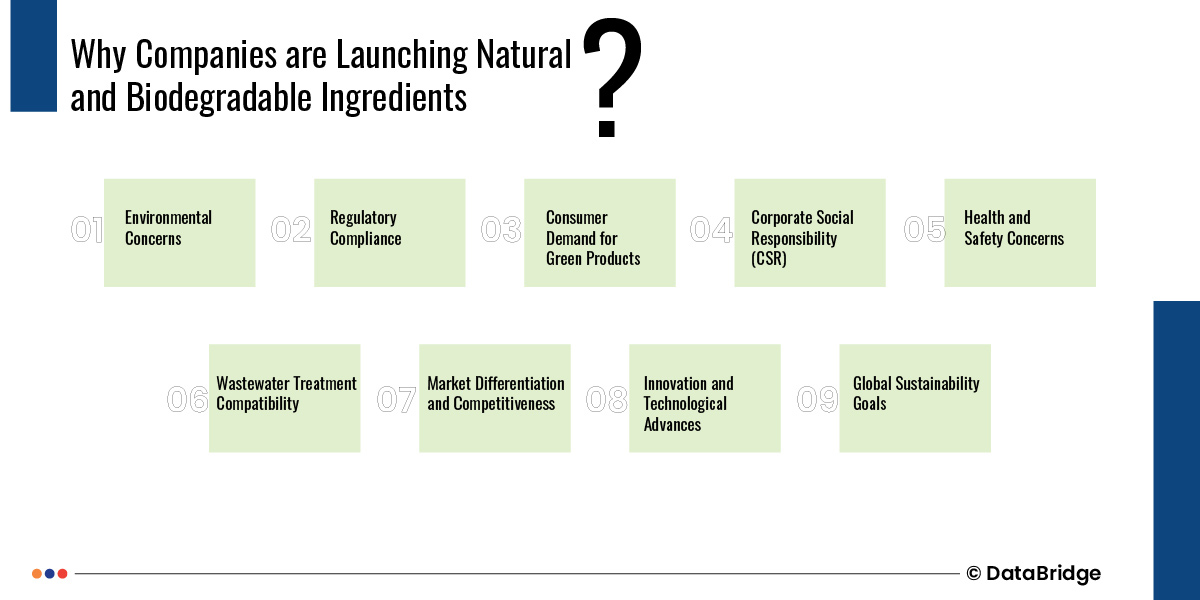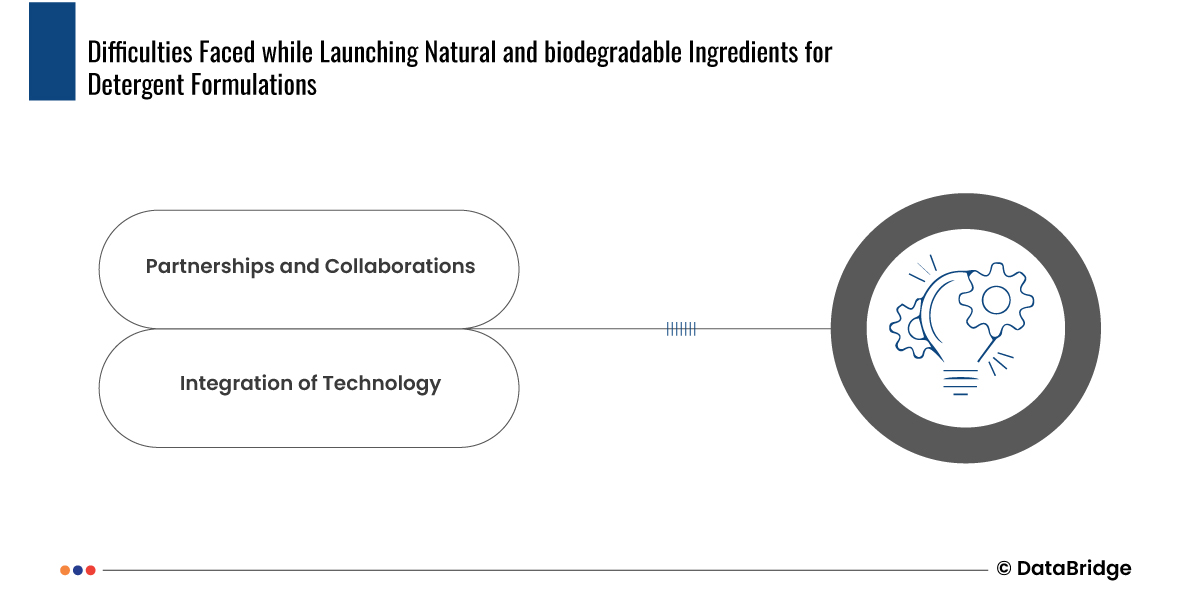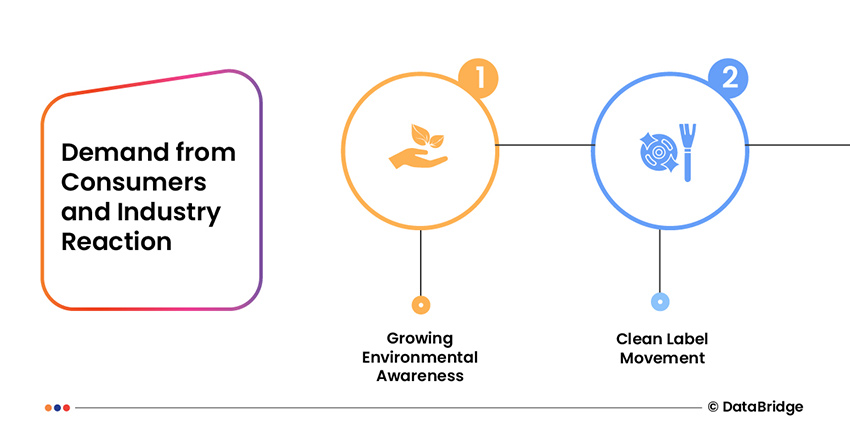Introduction
Ingredients that come from natural sources and can decompose and reintegrate into the environment without harming it are referred to as natural and biodegradable ingredients. These substances are frequently utilized as more ecologically friendly substitutes for synthetic or non-biodegradable counterparts in a variety of goods, such as cleaning supplies, packaging materials, and personal care items.
Natural and biodegradable components have become more popular across a range of businesses because of their favorable effects on the environment and possible health advantages. Natural components come from plants, minerals, and animals. They are not heavily processed so they keep their original qualities. Beeswax, essential oils, and plant extracts are a few cases. Conversely, biodegradable components naturally transform into innocuous compounds, hence reducing pollution in the environment. Microorganisms can break down materials such as organic matter and certain polymers.
Natural and biodegradable substances are used in a variety of product categories, such as cleaning supplies, packaging, and personal hygiene products. Sustainable qualities, smaller environmental impact, and decreased chemical exposure, consumers are drawn because of these components'. Selecting goods that have these components encourages environmentally beneficial behavior and contributes to a healthy earth.
The phrases "natural" and "biodegradable" may not have agreed-upon definitions. Therefore, it's important to carefully read product labels and certifications. Furthermore, taking into account a product's whole life cycle-which includes packaging and production techniques—ensures a more thorough assessment of its environmental effect. The growing consciousness of sustainability is propelling positive changes in consumer choices and business practices due to the increased desire for natural and biodegradable components.
The following are a few instances of biobased which is engaged in cosmetic ingredients:
- Oils derived from plants that are utilized in hair products, lotions, and moisturizers
- Fruit, vegetable, and herb extracts that may be used in skincare products
- Plant extracts are examples of natural preservatives that can prolong the shelf life of cosmetics
- Biodegradable exfoliants are suitable for body polishes and scrubs
- Fermented components can be incorporated into skincare products to enhance the texture of the skin
Why Companies are Launching Natural and Biodegradable Ingredients?

- Environmental Concerns: Growing consumer demand for sustainable and eco-friendly products is a result of growing environmental awareness. By dissolving into innocuous compounds, biodegradable chemicals in detergents lessen the environmental effect of conventional detergent compositions and the pollution they cause
- Regulatory Compliance: Strict environmental laws and policies are being implemented by governments and regulatory agencies. To avoid potential fines and penalties, companies are proactively modifying their formulas to comply with these rules
- Consumer Demand for Green Products: Natural and ecologically friendly goods are becoming more and more popular. Demand for detergents that are safe for personal use and kind to the environment is rising as more people become aware of their environmental impact
Data Bridge Market Research analyses that the global green and bio polyols market, which was USD 4.52 billion in 2022, is expected to reach USD 9.35 billion by 2030, growing at a CAGR of 9.50% during the forecast period of 2023 to 2030. In 2023, the polyether polyols segment will dominate the market due to its wide range of applications and the rising demand for green and bio polyols from the oil and gas industry. To know about the more market kindly visit the below mention website link,
https://www.databridgemarketresearch.com/reports/global-green-bio-polyols-market
- Corporate Social Responsibility (CSR): Environmental sustainability is becoming more and more integrated into business plans. Introducing detergent formulas that contain natural and biodegradable chemicals is in line with CSR efforts and enhances the reputation of the business
- Health and Safety Concerns: Ingredients that are biodegradable are frequently made from renewable resources and are less likely to have poisons, allergies, or dangerous substances. Because it takes care of health and safety issues, these detergents are appropriate for use in homes and workplaces where workers' welfare is a top concern
- Wastewater Treatment Compatibility: Detergents that are biodegradable are made to decompose more quickly in wastewater treatment plants. By doing this, the strain on water treatment facilities is lessened and non-biodegradable materials are kept from building up in water bodies
To know about the global industrial wastewater treatment market study in terms of qualitative and quantitative research on present scenarios, future trends, what major drivers and factors will boost the market demand, what type of challenges will be faced by the manufacturer, and growth potential for industrial wastewater treatment in market kindly visit the below mention website link.
https://www.databridgemarketresearch.com/reports/global-industrial-wastewater-treatment-market
- Market Differentiation and Competitiveness: Businesses see a chance to set themselves apart from competitors in the market by providing natural and biodegradable detergent formulas. This can draw in eco-aware customers and companies, giving them a competitive advantage in a congested industry
- Innovation and Technological Advances: Research and technological developments have made it possible to create natural and biodegradable detergent components that work well. Businesses are using innovation to develop detergent formulas that perform as well as or better than conventional detergents
- Global Sustainability Goals: A lot of businesses base their business plans on international sustainability objectives, such the Sustainable Development Goals (SDGs) of the United Nations. The introduction of environmentally friendly detergent formulas helps to accomplish objectives for clean water, climate action, and responsible consumption
For the last couple of years, companies are continuously engaged with launching natural and biodegradable ingredients for cleaning industries.
For instance,
- By 2030, Unilever plans to stop using fossil fuels in its cleaning products
Rotterdam/London - Leading producer of cleaning and laundry goods, Unilever, in September 2020 had announced that it would replace all of the carbon in its formulas for cleaning and laundry products that come from fossil fuels with recycled or renewable carbon. The sustainability of well-known cleaning and laundry brands, such as Omo (Persil), Sunlight, Cif, and Domestos, will be drastically altered by this action.
This new goal is a key element of Unilever's "Clean Future," an innovative project launched by the company's home care business to radically alter the development, production, and packaging of some of the most well-known cleaning and laundry products on the planet. Clean future is distinct in that it aims to lower carbon emissions by integrating the concepts of the circular economy into product compositions and packaging for large, international businesses.
The majority of cleaning and laundry solutions on the market today are composed of chemicals derived from fossil fuel feedstocks, which are a non-renewable carbon source. Unilever is making a conscious effort to transition away from the fossil fuel economy by switching to recycled or renewable carbon sources for these compounds. Clean future, the first project of its kind, is a vital step in achieving Unilever's goal of net zero emissions from its goods by 2039.
Throughout their lifetime, the majority of Unilever's cleaning and laundry products' carbon impact (46%) is attributed to the chemicals they contain. Thus, by moving away from chemicals produced from fossil fuels in product formulations, the firm will open up new avenues for lowering the carbon footprint of some of the largest cleaning and laundry brands globally. Unilever anticipates that this program alone will cut the product formulations' carbon impact by up to 20%.
- Nouryon commissions a biodegradable chelates production plant in the Netherlands in response to the increasing demand from consumers for environmentally friendly liquid laundry and vehicle dishwashing solutions
To know more about the chelating agents market research study in terms of qualitative and quantitative research on present scenarios, future trends, factors driving the market consumption in upcoming years, industry challenges, and market growth potential in demand from pulp & paper industry in the market kindly visit the link below.
https://www.databridgemarketresearch.com/reports/global-chelating-agent-market
"Investments in sustainable solutions with high renewable content are Nouryon's top priority without compromising performance," stated Larry Ryan, Nouryon's executive vice president and president of Performance Formulations and the Americas. "Home and Personal Care is a strategic market for Nouryon, and we have a global manufacturing footprint to support it. Nouryon's are seeing a big shift in demand from traditional petroleum-based solutions to biodegradable options."
By providing Dissolvine M or MGDA (methylglycine N,N-diacetic trisodium salt), Dissolvine GL or GLDA (glutamic acid, N,N-diacetic tetrasodium salt), and other necessary ingredients to a range of regional and multinational clients, the new production facility will double the company's capacity for Dissolvine green chelates. The location will enhance the business's current facilities in Ohio, USA, and Ningbo, China.
BASF SE introduces novel solutions from its innovative pipeline in response to contemporary market and customer demands
- A new generation of enzymes from BASF's Lavergy range enhances the company's enzyme technology for detergents and cleansers
- For all automated dishwashing forms, the biodegradable polymer Sokalan Ecopure C offers high-performing and environmentally friendly solutions
- BASF introduces Emulgade Verde 10 MS, a new O/W emulsifier, to broaden its polyglyceryl fatty acid ester technology
- Sustainability and openness are brought to the personal care business via digital advancements
Towards a future that is more sustainable
- The Personal Care division of BASF SE is creating new sustainable products to add to its extensive portfolio in response to the increasing demands of its customers for change. "Because of its close proximity to the end user, the Personal Care unit is especially focused on driving sustainable innovations," stated Dr. Becky Stiles, Head of Applied Sustainability, EU & APAC, Care Chemicals
- A dual-purpose dirt release polymer for liquid laundry detergents is introduced by Clariant.
In October 2023, at TexCare Gemini SG Terra, Clariant's newest breakthrough for formulas of laundry detergent that are difficult to thicken was introduced. The solution gives formulators a dirt release polymer with "one product, double function" that controls the detergent's rheology. The novel approach complies with sustainability requirements, much like existing TexCare grades. It was first released as a component of the Terra line by Clariant and has an 80% Renewable Carbon Index. The new polymer is easy to use and has rheology control technology, but it also works well when washing garments that include polyester.
Additionally, similar to all TexCare grades, it permits shorter and cooler wash cycles, which increases customer convenience and uses less water and energy while also assisting in the production of clothing.
Difficulties Faced While Launching Natural and Biodegradable Ingredients for Detergent Formulations

- Partnerships and Collaborations: To create cutting-edge formulas for sustainable detergents, businesses are forming partnerships with environmental organizations, suppliers, and academics. These collaborations promote industry breakthroughs and the sharing of information
- Integration of Technology: Technological developments, including biotechnology and green chemistry, are propelling the creation of new detergent components. These developments are essential to achieve sustainability objectives and preserving product efficacy
Demand from Consumers and Industry Reaction

- Growing Environmental Awareness: As consumers become more aware of their environmental effect, the demand for items with a small ecological footprint rises. Manufacturers of detergents are adjusting their products to better fit sustainable practices after seeing this trend
- Clean Label Movement: This movement places a strong emphasis on product component transparency. Customers are actively looking for goods that don't contain any dangerous substances and have identifiable, short ingredient lists. Businesses are using this need to advertise the formulas of their ecological and biodegradable detergents
Conclusion
The inclusion of organic and biodegradable components in detergent formulas marks a turning point in the sector's sustainability efforts. To stay ahead of the environmentally friendly revolution, businesses need to embrace innovation and teamwork as customer tastes continue to change. Delivering high-performance cleaning products while prioritizing environmental responsibility is the key to the future success of the detergent sector.


